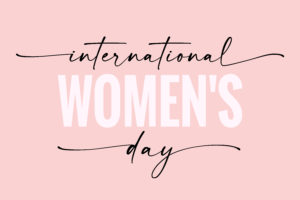“We Cannot All Succeed When Half of Us are Held Back.”
– Malala Yousafzai

This time last year, I wanted to use National Women’s History Month as an opportunity to highlight the vital contributions of women throughout our nation’s history, as well as the challenges we still face. But there are also over 3.5 billion females living outside of the United States. And so, embracing the words of Pakistani activist Malala Yousafzai, I cannot let International Women’s Day go by without bringing attention to the challenges women face worldwide.
Of the 193 UN member states, only 63 countries have had a woman seated at the top position of executive power since 1960. Despite an increase in female heads of state over that time, it is estimated that if the rate of increase continues, worldwide gender parity won’t be reached for 130 years. The outlook is only slightly better in national legislative bodies. Worldwide, only 25% of representatives at the national level are female. If the current rate of increase holds, it will take until 2063 for parity to be reached.
Female representatives aren’t only important to reach aspirational metrics. Equal representation also brings attention to previously neglected issues. Research from India shows that areas that have women-led local councils undertake 62% more drinking water projects than areas with male-led local councils. To support female political participation, donate to organizations like Mina’s List.
We must not only focus on the women (or lack thereof) at the top of society, but also the women forced to its fringes. Worldwide, 129 million girls do not attend school. 32 million of these girls are at elementary school age, 30 million are at middle school age, and 67 million are at high school age. Undoubtedly, quality education provides girls access to better jobs and higher incomes, but it also decreases the rate of child marriage, child mortality and maternal mortality. To support free, safe, and quality education for girls, donate to organizations like the Malala Fund.
In 30 countries around the world, more than 200 million females have been forced to undergo female genital mutilation. The majority of these females are under the age of 15. Not only does this senseless violation provide no health benefits to women, this procedure can cause infection, chronic pain, patient death, and newborn death. To bring an end to female genital mutilation, support organizations like 28 Too Many.
It is estimated that 736 million women worldwide (nearly one-third) have been subjected to physical or sexual violence. More than 640 million of these women were abused by an intimate partner. The majority of these women do not seek either formal or informal help, with less than 10% of these women seeking help from police. To end violence against women, support organizations like Futures Without Violence.
This is by no means a complete list of the injustices women face, nor of the ways to make a difference. We can all take action in our own lives to further the place of women. These injustices drove me to open my own firm at a time when less than 20% of businesses in the nation were women-owned. Every day, they push me to improve my practice. I want to show the world that women deserve to have a seat at the table. I want to show the next generation of women that although it is not easy, it is possible. I want Ward Law to make a difference.

